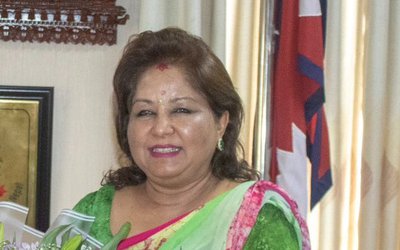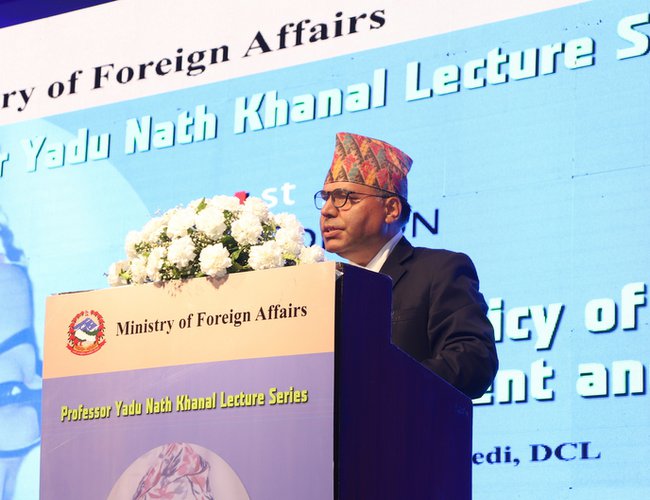
With the Russian invasion of Ukraine, the world order has been deeply polarized again. At a time when Nepal’s two neighbors India and China are absent in the UN voting on the issue, Nepal firmly stood against the Russian invasion of Ukraine and voted to support Ukraine’s national integrity and independence.
Given the intensity of division in global politics, starting an academic discussion on the issues of Nepal’s foreign policy is highly important. Unlike using a highly sensitive terminology like Sagarmatha Sambad, at the start of a series of discussions, taking a moderate posture, is a diplomatically right step.
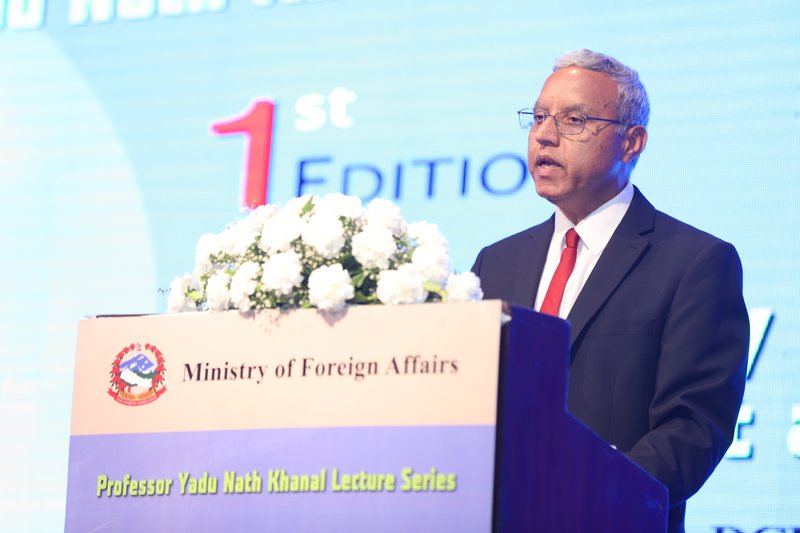
Situated between two prominent global powers, India and China, a small country like Nepal has no option other than to understand its limitations. In this context, choosing to feature YN Khanal, a career diplomat, and highly acknowledged for his caliber, in the lecture series is a wise work of the ministry.
At the function attended by people from different walks of life including Kathmandu-based foreign diplomats, secretaries, former Nepalese ambassadors and cadres of the Ministry of Foreign affairs, many experts termed this initiative important.
“Thought-provoking discussion about Nepal’s foreign policy - past, present & future. The inaugural Prof YN Khanal Lecture, delivered by Prof SP Subedi proposed new opportunities to position itself as a middle power,” tweets Felicity Volk, Australian Ambassador to Nepal.
Other ambassadors also hailed the series to know Nepal’s policy. However, some also pointed out the shortcomings of the lecture. Although Nepal voted in favor of Ukraine denouncing the Russian invasion in UN, no one said anything on the series regarding Nepal’s position.
After the establishment of diplomatic relations between the United Arab Emirates and other Gulf nations like Bahrain with the Israel, the global diplomatic position on Middle-East and Israel are changing. Although Nepal was the first country in South Asia to establish diplomatic relations with the state of Israel 62 years ago, Nepal’s voting pattern in the UN regarding the issue of Israel has not changed.
Although Professor Dr. Surya Subedi talked about the need to change Nepal’s policy to go global, he did not speak any word regarding Nepal’s position on the changed context of the Middle- East, and Israel.
“Nepal is unable to provide strong support to Ukraine’s independence as it did in the UN voting. No one spoke about the invasion and Ukraine’s painful suffering,” said a foreign diplomat on condition of anonymity.
New move
With the assumption of the post of foreign minister by Dr. Narayan Khadka, who is himself a scholar on Nepal-India relations, and well-informed foreign secretary Bharat Prasad Paudyal and capable career civil servants of Foreign Service, two recent initiatives are taken by the Ministry of Foreign Affairs will contribute to making foreign ministry as a professional institution.
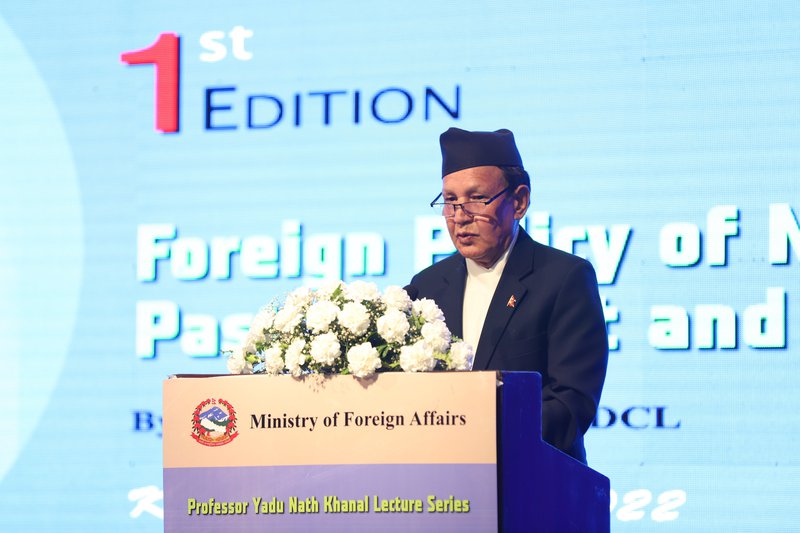
By the way, highly important questions were posed by young civil servants working at the Ministry of Foreign Affairs during the discussion at the YP Khanal series, one can see the institutionalization of Ministry of Foreign Affairs with a new breed of diplomatic cadres.
After observing the first Foreign Service Day, the Ministry of Foreign Affairs started the lecture series named after Professor YN Khanal, a legendary scholar, bureaucrat and a career diplomat of Nepal’s foreign policy. The first edition of Prof. YN Khanal Lecture Series concluded by debating various issues related to Nepal’s foreign policy.
One hour-long presentation and another half-hour-long discussion highlighted the concurrent global and regional issues and Nepal’s positions and places in the new order, the organizers said.
The keynote speaker at the program, Prof Surya Prasad Subedi, said the foreign policy of Nepal must have a global outlook; it must go beyond its preoccupation with the management of relations with its two immediate neighbors. “Nepal has to grow out of ‘a yam between two stones’ mindset and the self-defeating notions of an insignificant, improvised and peripheral state tucked away in the southern flanks of the Himalayas.
Describing various historical events in Nepal’s history of foreign policy, Professor Dr. Subedi said that concluding the 1950 Treaty of Peace and Friendship with independent India following the British withdrawal from South Asia is one of the significant events for Nepal.
“This treaty is significant for two main reasons; first it was more or less a modified version of the 1923 treaty with the British, and second it defines the nature and scope of Nepal’s relations with India,” said Professor Dr. Subedi
By maintaining cordial relations with India, British India, Nepal regained some of the lost territories and was able to secure formal recognition of independence and sovereignty through the 1923 treaty concluded with the British during the height of British imperial power. The establishment of the UN when Nepal established diplomatic relations with the United States, concluding a treaty of friendship and commerce on 25 April 1947, also a major development of Nepal’s international relations.
He said that King Prithvi Narayan Shah the great, Jung Bahadur Rana, Chandra Sumsher Rana, BP Koirala and King Mahendra, King Birendra and all the prime ministers, after the restoration of democracy till now, have greatly contributed to safeguarding Nepal’s national interest.
Addressing the Prof. YN Khanal Lecture Series, Foreign Minister Dr. Khadka said “Safeguarding of sovereignty, territorial integrity, national independence, and protection of national interest has been at the core of Nepal’s foreign policy all along.
Addressing the Prof YN Khanal Lecture Series organized by the Ministry of Foreign Affairs, he said that Nepal will continue to be committed to a balanced and independent foreign policy based on national interests. It is on this basis that Nepal has been developing friendly and good relations with its neighbors and other countries.
He emphasized the need to work together to address the common challenges facing the rest of the world in the face of increasing human and economic losses caused by the recent Russia-Ukraine war.
Dr. Subedi, a Visiting Professor at Oxford University, said that there is every prospect of more prosperity for Nepal, provided that the country is able to put in place sensible policies designed to exploit its comparative advantage and its geostrategic status.
Secretary at the Ministry, Bharatraj Poudyal, shared that such lectures would be conducted once in a year for discussion on regional knowledge enhancement, existing policies and practices.
Professor Yedu Nath Khanal, a well-known diplomat served as the secretary at the Ministry of Foreign Affairs and also as ambassador to China, India and the United States. The ministry has started this lecture series in his name and honor.
Attended by scholars, Kathmandu-based foreign diplomats, secretaries, former ministers, former carrier diplomats, media persons and cadres of the Ministry of Foreign Affairs, this is a major event organized to explore Nepal's foreign policy issues.
“It gives me great pleasure to welcome you all here tonight on the occasion of the very first in the Professor Yadu Nath Khanal Lecture Series. The need to institute a platform for constructive and insightful deliberations on key foreign policy issues has been discussed in the Ministry of Foreign Affairs for a long time – it is with a great pride that we embark today on the first of the series,” said Minister for Foreign Affairs Dr. Narayan Khadka at the First Edition of Professor Yadu Nath Khanal Lecture Series
“This lecture series is named after Professor Yadu Nath K.hanal, who was himself a perfect combination of erudition, expertise, and modesty. It is a fitting tribute to him, and an apt recognition of his seminal contribution to shaping Nepal’s foreign policy and diplomacy that it is named in his honor.”
“Let me begin by thanking Professor Dr. Surya Subedi for accepting our invitation to be the keynote speaker here this evening. Today Prof Subedi joins us in celebration but we also recognize the dedication and readiness he has shown over many years to travel all the way from the United Kingdom to be here in Nepal to share his knowledge and expertise in the service of his home country whenever needed.
“Professor Subedi has succinctly encapsulated the evolution of Nepal’s foreign policy from its foundation. He has also suggested future outlooks for Nepal’s foreign policy. We are thankful for this contribution and dedication since it cannot be overestimated how useful it has been for the practitioners of foreign policy and diplomacy to hear perspectives from an academician with wide international exposure.”
Prof. Subedi’s views have emphasized the safeguarding of our sovereignty, territorial integrity, national independence, protection, and the promotion and advancement of national interest as cornerstones of Nepal’s foreign policy.
The foreign policy parameters defined by our Constitution serve as a guiding light for us and define a balanced and independent foreign policy and diplomacy. We strive to maintain friendly relations with our immediate neighbors, extended neighbors, development partners, major powers, the destination countries of our migrant workers, as well as all other countries of the world. The basis of these friendly relations is firmly rooted on sovereign equality and mutual respect; this is an approach that has always benefited us and has served our national interest well.
Rapidly changing dynamics of international politics and shifting power equations among major powers have rendered foreign policy-making and practice more dynamic and complex. The world was already facing significant uncertainties in the global social, economic and international peace and security arenas. These uncertainties were further compounded by the ongoing war in Ukraine. The devastating humanitarian crisis that this war unleashed also caused other far-reaching crisis that has affected millions of people globally. Higher inflation, ensuring food and energy security threats, slower economic growth and the drying up of international financial resources is contributing to significant negative supply shocks for the world economy. The growing threats to international peace and security and the escalating tension between world powers are directly linked to these uncertainties. Nepal is certainly not immune to this global tumult. Unlike in the past, today’s foreign policy is not limited to a set pattern of bilateral and multilateral institutional engagements alone, it also has to deal with mega challenges, such as climate change; financial, food and energy crises; international migration; refugee crisis; mass evacuation and repatriation of the population; transnational crimes; cyber security; terrorism and so forth.
In light of a rapidly changing global political landscape, the challenges of today’s foreign policy can only be addressed through the collective and collaborative efforts of all countries, big or small, operating under accepted norms of rules-based international order and through multilateralism. We consider that respect for and adherence to the principles of sovereign equality and non-interference enshrined in the Charter of the United Nations provide a sound basis for cooperation among nations and will allow us to tackle these challenges on a global scale.
Our present Government, led by Prime Minister Sher Bahadur Deuba, remains committed to maintaining Nepal as a democratic, peace-loving, and inclusive nation, where the respect for fundamental freedoms and human rights prevails. Attaining economic development and prosperity for our people stands as the high priority agenda for economic diplomacy.
The recent local governments have consolidated our democratic foundation and forcefully restated the supremacy of the popular will. Nearly 65% of 17.7 million voters peacefully participated and elected over 35 thousand representatives, including over 14 thousand women representatives. The entire international community has appreciated this successful democratic exercise – it is an extraordinary feat needs to be highlighted and celebrated.
The first lecture in the Professor Yadu Nath Khanal Lecture Series, whose aim was to share insightful assessments of Nepal’s foreign policy, now concludes on the positive note that it will continue as an important event in the Ministry’s annual calendar in the coming years.
We look forward to these regular events as an ongoing opportunity to continue to provide insights on areas of foreign policy.
“I would like to close by placing on record my special thanks to Professor Jaya Raj Acharya, a name intimate to Professor Khanal, who was with us throughout the preparation for this event but who unfortunately could not join us this evening due to a commitment outside the country.
I also thank Foreign Secretary Mr. Bharat Raj Paudyal and other colleagues at the Ministry for their contribution and dedication to making this event successful.
Special thanks also go to the media for their coverage of this program so that the insights that have been shared here can reach a wider audience. In addition, I am happy to announce that the lectures will be uploaded on YouTube and the Ministry’s website soon.
In closing, I extend sincere thanks also to our distinguished guests for their attendance and active participation. We look forward to getting together again next year to share more topical views.”
The history of Nepal’s foreign policy and diplomacy is a product of sacrifice, valor, wisdom, and craftsmanship of many people, said Bharat Raj Paudyal at the First Edition of Professor Yadu Nath Khanal Lecture Series. Of course, its evolution has not been the sole burden or responsibility of a few. But some people like Prof. Khanal have a bigger share in it, he added.
“Born in Tanahun District in August 1913, Prof. Khanal served as Nepal’s Foreign Secretary for the two terms (1961-62 and 1967-70) and Advisor to the Prime Minister on Foreign Affairs after 1990. Apart from various other responsibilities, he served as Nepal’s Ambassador to China, India and the United States.”
Prof. Khanal steered the development and intellectualization of Nepal’s foreign policy in its formative years with dignity and distinction. He demonstrated, in diplomatic practice and through his writings, the sharpness of judgment on how Nepal could pursue its vital interests against the constraints of various kinds.
He led the drive to diversify and expand Nepal’s diplomatic contacts and engagements. His counsel derived from his vast experience and in-depth study continues to serve as important pointers to the succeeding generations of Nepali intellectuals and Foreign Service officials.
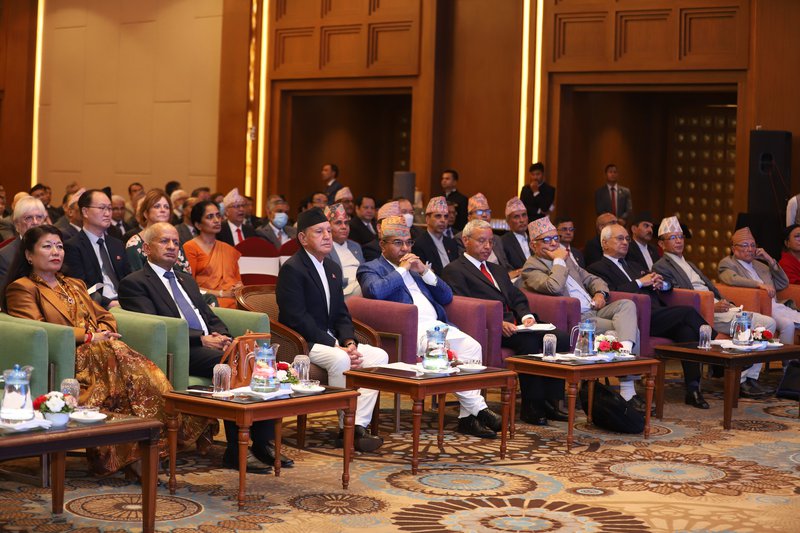
He held a principled view that a country like Nepal needs to maintain clarity, consistency, credibility and coherence in foreign policy. This continues to be as relevant today as it was in the times of Prof. Khanal.
This lecture series, therefore, is an effort of the Ministry to pay tribute to Prof. Khanal. We plan to host such a lecture annually on the issues of national, regional and global importance that have direct bearing on Nepal’s national interest and the conduct of foreign policy. We hope that the deliberations of the lecture series will help better understand and navigate through the dynamics of the contemporary issues.
The series is expected to inspire the current and future foreign policy practitioners to internalize the values, ideas and ideals that Prof. Khanal epitomized and expounded. This will also serve as a platform of acquiring better insight into the art of diplomacy. More importantly, it is expected to substantively contribute to Nepal’s foreign policy process.
He is a professor of international law at the University of Leeds, England, and a visiting professor at the University of Oxford. He has fulfilled important international responsibilities including under the UN mandate. Between 2007 to 2012, he was UN’s Special Rapporteur for Human Rights in Cambodia.
He is the author of several books, including a seminal book on Nepal’s foreign relations. He has provided expert advice to successive governments and leaders of Nepal.
Holding two important functions, Ministry of Foreign Affairs has made a good attempt to explore new ways. This is expected to be more lively and wide in the coming days.

Keshab Poudel
Poudel is the editor of New Spotlight Magazine.
- HELVETAS NEPAL’S RIVERBED FARMING: Shift From Overseas To Local Farming
- Jul 26, 2024
- POLITICAL SCENARIO : K.P. Sharma Oli's Resurgence
- Jul 21, 2024
- UNDP/MinErgy: An Inventive Approach To Clean Brick Kiln
- Jul 19, 2024
- HELVETAS NEPAL: Nutrition Through Riverbed Farming
- Jul 18, 2024
- NOU Opens To All: Dr. Shilu Manandhar Bajracharya, Vice Chancellor
- Jul 15, 2024






